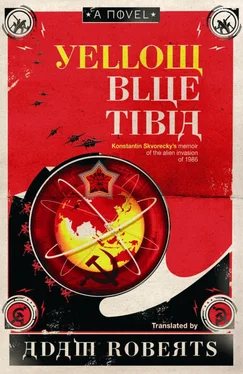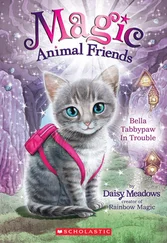‘Not Germans,’ insisted Rapoport.
‘But against this threat — a perfectly unhuman enemy — the whole of humanity could unite. We would have that,’ I paused, for I had been about to say paradox , but instead I said, ‘that dialectical synthesis: a fully peaceful world that is simultaneously united in a great patriotic war !’
‘Peace,’ said Sergei. And then, in a high-pitched voice, ‘Comrade, will there be a war?’ And then, rapidly, in a lower voice, ‘No, comrade! But there will be such a struggle for peace that not a stone will be left standing.’ He laughed at his own joke. It was an old joke.
‘I think that Konstantin Skvorecky is correct,’ said Kaganovich. ‘We have the chance to perform a massive public good. And what have we ever actually achieved, as writers? What are we ever likely to achieve? As science fiction writers? Escapist junk, mostly. Missions to other worlds? Sentient comets? Clouds of black spores that soak into the atmosphere and make the trees come to life and walk around on sap-filled tentacles? Junk, all of it. This, however, this could be something worthwhile .’
‘I have a problem,’ said Nikolai Nikolaivitch Asterinov, getting to his feet. ‘I have a problem, that I wish to share with this, our science fiction writers’ collective. We are to concoct a race of aliens against which humanity can unite. Spacefaring aliens, no?’
‘Yes, of course.’
‘Then this is my problem. We know the party line. The philosophy of the party has always been that capitalistic Western fantasies of launching rockets to other planets will always be doomed by the internal contradictions of the competitive inefficiency of capitalism itself. Only the combined and unified effort of a whole people would be able to achieve so monumental an achievement as interstellar flight. No capitalist race could ever achieve something as sophisticated as interstellar flight; only communists could do this. Now, how can it be that these evil aliens are able to build spaceships and fly across the void? Surely they are not communists?’
‘Sit down,’ said Sergei. ‘You’re making a fool of yourself.’
‘In Three Who Made a Star ,’ said Nikolai Nikolaivitch, still standing, the — what were they called?’
Three Who Made a Star was one of my novels: an alternate history in which World Communist Revolution had taken place in first-century Judea. I spoke up. ‘What do you mean?’
‘The aliens they meet, in that novel. The ones with the three legs, and the spaceships made of spittle?’
‘The Goriniks.’
‘They. They were a socialist race, were they not? And you, Frenkel, in your Arctic story, the beings who live under the ice…’
‘Stop this,’ said Sergei, loudly. ‘Sit down, Nikolai Nikolaivitch. You’re making a fool of us, before our distinguished comrades.’
Asterinov looked around him, settled his gaze on Malenkov, and settled back into his chair. ‘I’m sorry,’ he said. ‘Too much wine. Too much wine.’
One other thing I particularly remember from that first evening together, as the alcohol was drunk, was how clearly the grandiose nature of our ambitions manifested. Were we despised writers of pulp science fiction? By no means: rather, we were the inheritors of Pushkin and Tolstoy, of Homer and Shakespeare. ‘We shall write a new Iliad ,’ announced Nikolai Nikolaivitch. ‘We shall write mankind’s greatest epic of war!’
‘We have just finished a war,’ I pointed out, in a glum voice.
War never finishes,’ said Frenkel. ‘How could war finish? What is there apart from war?’
The unspoken answer to his question rubbed a silence into the conversation like salt in a cut. Eventually, after a long pause, Frenkel went on. ‘Life is war, life is struggle, we all know that. And hard as the last war was, can we honestly say it was harder than the thirties?’ He was so drunk that, despite the fact that Malenkov was still sitting in the corner of the room eyeing us thoughtfully, Frenkel essayed an impression of Stalin himself, purring his rs like a Georgian. ‘Surely, comrades, you remember the thirties?’
Kaganovich laughed. Nobody else did.
‘It is in the nature of Marxism itself,’ said Frenkel, in a heavy, yokel voice, ‘in the very fabric of dialectical materialism, that life consists of conflict, of enemies all about us who cannot be appeased and who must be destroyed. After war comes — not peace, but more war. And we are gifted here! Gifted by historical necessity! Gifted by the news that we shall be the ones to shape this new war. This next war! It will be ours! War and war !’
‘I had thought,’ I said, ‘that the next war was to be against the Americans? To correct you, comrade, on one small point: we are planning the war after next.’
War and war and war ,’ said somebody. With an alcohol-delayed jolt, I realised it was Commissar Malenkov. He was getting, slowly, to his feet, an unreadable smile on his face. Bluster as we might, we were all intensely aware that it would require only one phone call from this man to turn us all into corpses before the sun rose. All of us stared at him. All conversation stopped dead. ‘Goodnight, gentlemen,’ he said, with a curiously old-world courtesy. That I didn’t like. That none of us liked. And he left the room.
After a space of time Kaganovich said, ‘Jan Frenkel, your mouth will be the death of us. Jan . Jan.’ And Frenkel blushed the colour of spilt blood, and looked furious, though he said nothing.
4
So our new phase as writers of science fiction began. We were in that dacha, like a high-class barracks, for months. We fell into a rhythm; working as one group or separating into smaller groups during the morning; then a long lunch, and perhaps a sleep. Then late afternoon and evening, working further. The soldiers guarding us brought us some of what we asked for: paper; pens; cigarettes (Russian cigarettes, alas).
Our mornings began with a gathering in the dacha’s largest room to discuss, and make notes. Lunch would be our larger meal, brought to us by a surly battalion chef called Spiridinov. We worked and worked; mostly I made notes in a succession of notepads, and Nikolai Nikolaivitch typed them up on an enormous nineteenth-century typewriter that clattered like a rusty machine-gun.
In the evening, soup was brought in, straight from the oven and still in its copper pan. This was settled on the windowsill, where the sunset polished red gleams from the metal.
Sometimes we were supplied with vodka, sometimes not. In that respect it was like being back in the army.
We discussed and planned the nature of the alien foe that would threaten the whole of humanity. We decided that their weaponry would be atomic — very up-to-the-minute, this, for the mid-1940s. You must remember that there had been no official notification of the American atom bomb attack on Japan; our version of atomics was that of science fiction from the 1930s. But Comrade Malenkov personally approved this part of our design. We could imagine why; that such a threat would justify the Soviet Union in the accelerated development of its own atomic weaponry. We wrote pages and pages of human interest material, heroic exploits by soldiers of the Global Soviet; wicked traitors to the cause of humanity (Jews and homosexuals and the like); scene setting. We spent nearly a week on a set of stories about children encountering aliens. ‘And yet we have not decided on the nature of these aliens!’ Nikolai Nikolaivitch declared.
Grey rain fell all day. The sound of an endless flurry of wings behind the glass.
5
The weather cleared. The view from the glass doors was of hills, rising, sinking, and in places were hollows or sockets, grassed over but pooling the shadow until noon.
Читать дальше












